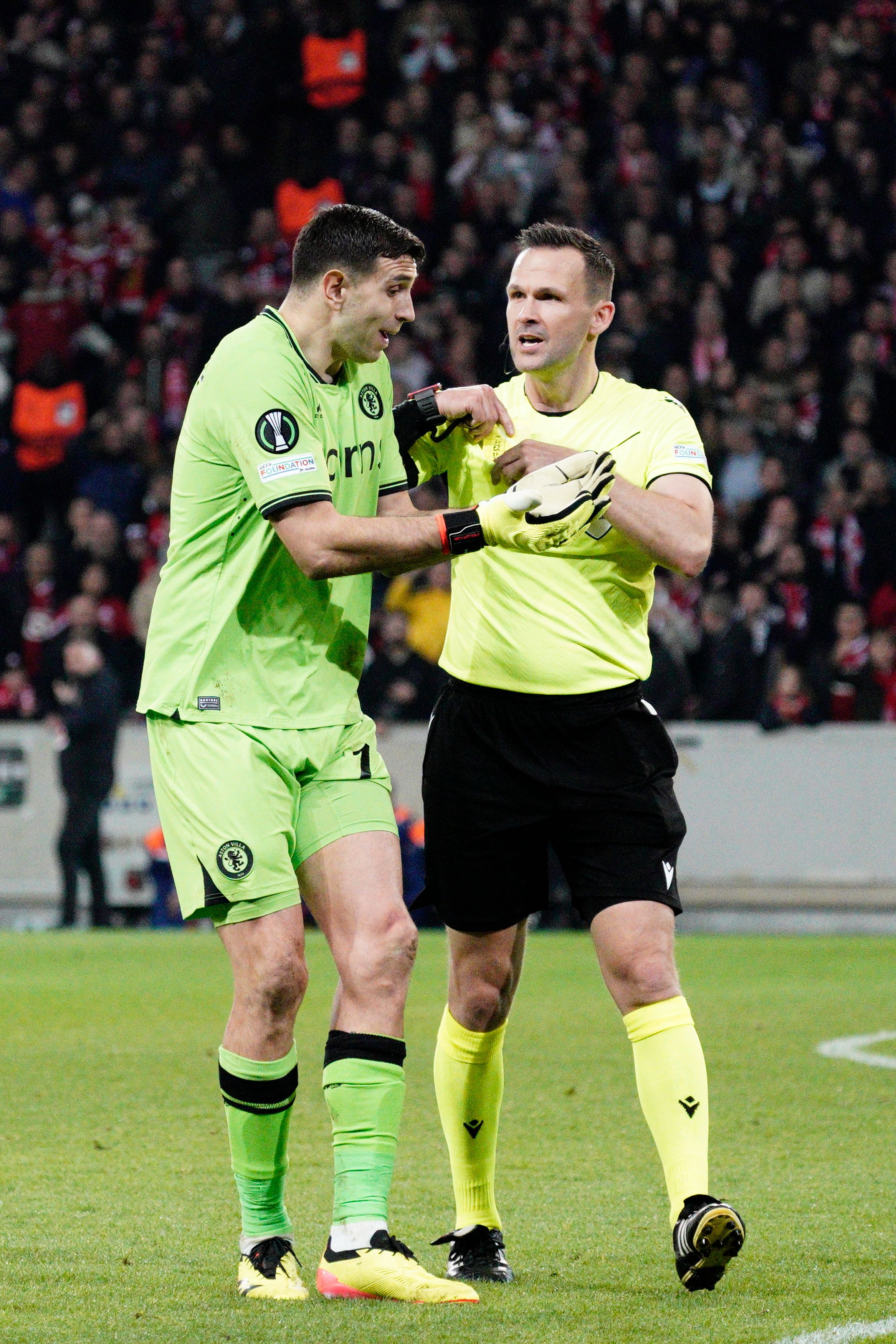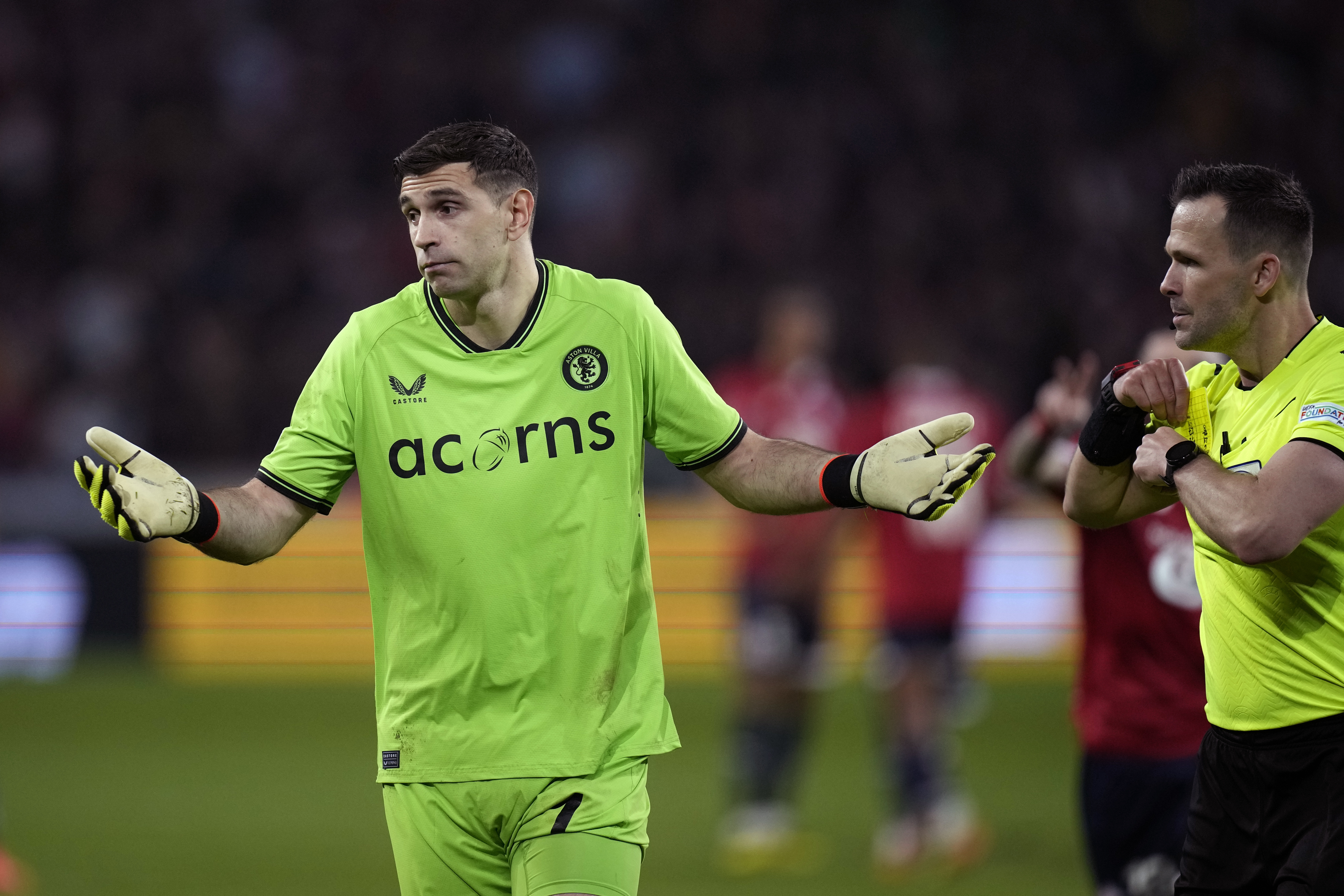Emiliano Martinez, the goalkeeper for Aston Villa, will miss the first leg of the Europa League semi-final against Olympiakos due to a ban imposed by Uefa. The Argentine player was booked twice during the quarter-final tie with Lille, leading to his suspension for the upcoming crucial match.
Controversial Bookings
Martinez received three bookings across both legs of the quarter-final tie with Lille, causing him to be banned for the upcoming semi-final match. Despite getting a second booking during the penalty shootout, he was not sent off, leaving many surprised by the decision.
Uefa's Rule Book
The basis for Martinez's suspension lies in Article 52.02(b) of Uefa's rule book, which states that players and team officials are suspended for the next competition match after receiving three cautions that did not result in a red card. This regulation led to Martinez's ban for the semi-final clash with Olympiakos.
Martinez's Response
Martinez expressed bewilderment at the yellow card saga, attributing it to his perceived reputation for time-wasting. The goalkeeper found the referee's actions confusing, particularly after receiving a booking for requesting a ball during the penalty shootout.

Martinez will be forced to watch from the sidelines as Aston Villa takes on Olympiakos at Villa Park on May 2.
Frequently Asked Questions
Should I wear compression clothing when playing soccer?
Compression clothing, like shorts or leggings for women, can benefit football players. It increases blood circulation, helps reduce muscle fatigue, speeds up recovery and improves performance after games or training. It’s also thought that the tight fitting material helps stabilize the muscles. The choice to wear compression equipment is personal. Comfort should be the main consideration when selecting this type of equipment.
What are the best goalkeeper gloves?
Goalkeeper gloves with a latex palm offer the best grip under various playing conditions. The latex density and thickness can be varied to balance grip with durability. Gloves with finger protection systems, such as spines or stiffening material, can also prevent hyperextension injuries. It is important that the gloves are comfortable and fit properly to ensure that goalkeepers can perform at their highest level.
Do there exist specific rules governing the equipment used in competitive football matches
Yes, competitive football matches often enforce specific equipment regulations to ensure player safety and game integrity. The rules of the game specify standard equipment, such as jerseys and shorts with sleeves. They also stipulate socks that cover shinguards, and footwear. Adornments and equipment that pose a danger to the player or opponents are strictly prohibited. It’s imperative for players to adhere to these regulations, which can vary by league and age group, to avoid penalties or disqualification from play.
What should I look for when choosing a football?
Consider the size, construction, and material of a football when selecting one. Size 5 is the standard for players aged 12 and above, including adults. Sizes should be smaller for younger players. Leather for natural grass surfaces and synthetic materials on rougher surfaces are the best options. Thermo-bonded footballs are more waterproof and retain their shape better than those stitched. Durability and flight stability should also be considered.
Can socks affect a player’s performance in football?
Absolutely. Football socks protect and support the player’s foot during intense play. They prevent blisters, keep the shinguards firmly in place, and cushion the feet. Good football socks improve the comfort of a player, which in turn can influence their performance.
Statistics
- Studies show that the proper use of shin guards can reduce the risk of injuries in football players by up to 70%.
- Around 25% of youth football players have reported using equipment that is either outdated or not suited to their position on the field.
- Research has indicated that around 60% of football-related ankle injuries could be mitigated with the correct choice of footwear.
- Approximately 40% of amateur football players wear boots that are not properly fitted, increasing the risk of foot injuries.
- Compression garments are used by about 50% of professional football players during training sessions for muscle support and injury prevention.
External Links
podiatrytoday.com
decathlon.co.uk
adidas.com
soccer.com
uksoccershop.com
How To
How to Select Football Equipment That Meets League Standards
To ensure your football equipment is compliant with the league’s regulations, check to see if it has been approved. Check with your league’s governing body for a list of approved equipment and branding requirements. This will include specifications for gloves, helmets and shoulder pads. You should be informed of any rule modifications that could affect your equipment. This applies especially to those playing at the highest level, where regulations for equipment may be more strict. It is important to comply with the rules and regulations. This will ensure your safety as well as avoid penalties or disqualification.
Did you miss our previous article…
https://www.sportingexcitement.com/football/premier-league/swansea-wonderkid-sam-parker-sought-after-by-european-giants-and-burnley/

